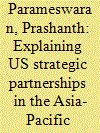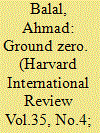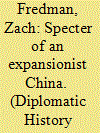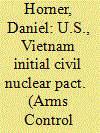|
|
|
Sort Order |
|
|
|
Items / Page
|
|
|
|
|
|
|
| Srl | Item |
| 1 |
ID:
131586


|
|
|
|
|
| Publication |
2014.
|
| Summary/Abstract |
The article seeks to analyze the gradual evolution of the Vietnam- United States relations in the post- Cold War years, after the fall of the erstwhile socialist friend of Vietnam, the Soviet Union and particularly after the genesis of the new millennium. It also seeks to analyze the interaction between the two countries in multilateral forums such as the Association of South East Asian Nations. Is the relations a portrait of perfect congruence of interests or is it conditional upon other imperatives? What are the factors that have brought the two countries closer to each other thus far in the twenty- first century? And what are the implications of the relations for the Indian foreign policy makers?
|
|
|
|
|
|
|
|
|
|
|
|
|
|
|
|
| 2 |
ID:
134033


|
|
|
|
|
| Publication |
2014.
|
| Summary/Abstract |
Since the mid-1990s, strategic partnerships have emerged as a new form of alignment between states, particularly in the Asia-Pacific region. Yet only recently has the United States begun to pursue such relationships, especially under the Obama administration which has signed new partnerships with Indonesia, Vietnam, Malaysia and New Zealand. As a result, the current literature does not yet include significant study on how the United States views strategic partnerships. This article attempts to fill this gap by exploring the emergence of strategic partnerships as a new form of alignment in US strategy in the Asia Pacific under the Obama administration. Drawing on the existing literature on alignment, government documents, as well as conversations with policymakers from the United States and Southeast Asia, it argues that Washington is pursuing strategic partnerships as part of a deliberate effort to both enlist target countries to share the burden in addressing challenges and to institutionalize its relationships in the Asia Pacific. It constructs an original three-part analytical framework to understand how US policymakers conceive, craft and evaluate strategic partnerships in the Asia Pacific and applies it to analyse the similarities and differences in US partnerships with Indonesia and Vietnam.
|
|
|
|
|
|
|
|
|
|
|
|
|
|
|
|
| 3 |
ID:
132547


|
|
|
|
|
| Publication |
2014.
|
| Summary/Abstract |
The signing of the proposed bilateral security agreement between the US led coalition and the Afghan government is nowhere near sight, even though the declared deadline for the complete withdrawal of coalition-led forces by the end of 2014 is drawing closer everyday. This has led to a feeling of growing pessimism amongst the general public as well as those at the helm of public affairs; there is ample historic evidence to support this phenomenon. It took barely a few years for the South Vietnamese regime to fall into the hands of the North Vietnamese after the departure of US troops and drawing up on financial support, the fall of Dr. Najibullah's pro- Soviet Kabul regime to the Taliban was no different a story. While the Soviet invasion of Afghanistan was successfully thwarted when Soviet troops withdrew a decade later by an alliance whose three main partners were Saudi Arabia, Pakistan and the United States, it was the latter's unceremonious and almost sudden withdrawal from this theatre of war, which sent this region into a socio-political mayhem, which continues to date with no immediate end in sight.
|
|
|
|
|
|
|
|
|
|
|
|
|
|
|
|
| 4 |
ID:
132009


|
|
|
|
|
| Publication |
2014.
|
| Summary/Abstract |
The Chinese Revolution, Korean War, and McCarthyism loomed large over Kennedy administration assessments of Chinese intentions in Vietnam. The president and his advisors disagreed over the exact nature of the Chinese threat, but they uniformly believed in a dangerous, expansionist China. Their assessments promoted cautious escalation in Vietnam, where Kennedy sought to avoid "losing" another Asian country to Communism without provoking another war like Korea. This, in turn, promoted Chinese militancy. Central to Kennedy administration thinking was the idea that Vietnam served as a test case for Beijing's more radical foreign policy line vis-à-vis Moscow. This article traces the development and influence of such assessments. It also argues that the China factor informed Kennedy and Johnson administration notions of credibility. Holding back or reversing Communist gains in Asia by supporting Saigon offered these administrations the chance to kick once and for all the "who lost China" stigma that had haunted the Democratic Party since 1949.
|
|
|
|
|
|
|
|
|
|
|
|
|
|
|
|
| 5 |
ID:
128068


|
|
|
|
|
| Publication |
2013.
|
| Summary/Abstract |
The United States and Vietnam last month initialed an agreement for civilian nuclear cooperation in what may be an indicator of future U.S. policy governing the nonproliferation requirements for such agreements. The text of the agreement, which U.S. Secretary of State John Kerry and Vietnamese Foreign Minister Pham Bình Minh initialed Oct. 10 in Brunei, has not been made public. Sources said it contains a Vietnamese commitment, although not a legally binding one, to refrain from pursuing uranium enrichment and spent fuel reprocessing. The Obama administration has been conducting an internal policy review for at least three years on the question of how hard the United States should press its potential nuclear trade partners to forgo enrichment and reprocessing activities, which are considered sensitive because they can be used to produce nuclear explosive material.
|
|
|
|
|
|
|
|
|
|
|
|
|
|
|
|
| 6 |
ID:
169233


|
|
|
|
|
| Summary/Abstract |
This paper seeks to examine U.S.-Vietnam relations under the Trump administration. It will concentrate on the political, economic and security dimensions of the relationship. It will demonstrate that the Trump administration's policy towards Vietnam has many elements of Obama's policy towards Vietnam. Though President Trump has focused on the trade deficit with Vietnam, the Trump administration has worked closely with the Vietnamese government to intensify the partnership with Vietnam. It should be noted that in the context of China's growing assertiveness in the South China Sea, Hanoi and Washington see that it is in their mutual interests to advance their security cooperation. The last two years have witnessed the increasing partnership between Vietnam and the United States.
|
|
|
|
|
|
|
|
|
|
|
|
|
|
|
|
|
|
|
|
|